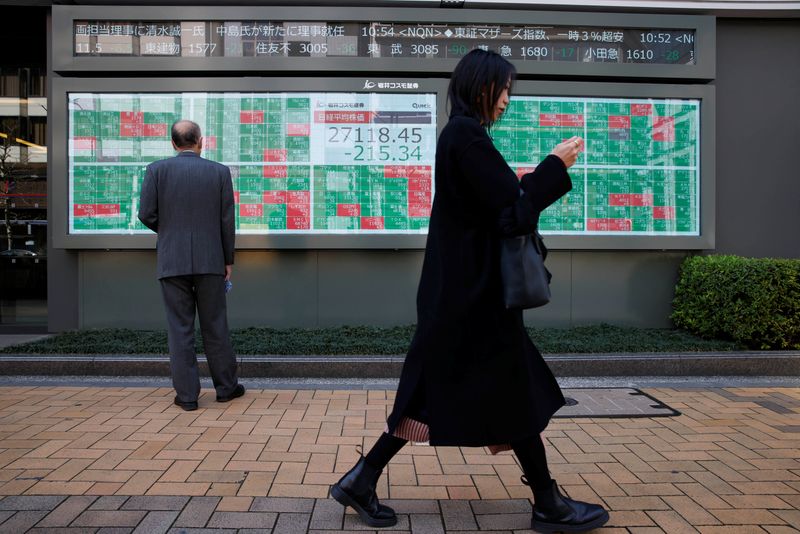By Jamie McGeever
(Reuters) - A look at the day ahead in Asian markets from Jamie McGeever, financial markets columnist.
Good news was good news on Tuesday, as another surprisingly strong snapshot of U.S. business activity boosted investor sentiment and risk appetite, which should pave the way for a positive open in Asian markets on Wednesday.
Upbeat U.S. economic data often fuels Fed rate hike expectations, dragging stocks and other asset markets lower. But not this time - investors cheered the unexpected expansion in manufacturing and service sector activity, and the gloom that has descended on markets recently lifted.
Asian markets should follow suit, as there's not much locally for traders to get their teeth into - Australian consumer inflation for September and the third quarter are the only numbers likely to have any meaningful market impact.
The three main U.S. indexes closed up between 0.6% and 0.9%, and U.S. tech giants Microsoft (NASDAQ:MSFT) and Google-parent Alphabet (NASDAQ:GOOGL) posted forecast-beating earnings after the bell.
Investors' immediate reaction, however, was mixed. Alphabet's cloud-based revenue fell short of analysts' expectations, pushing shares down more than 5% in after-hours trade, while Microsoft shares rose 4% after hours.
In Asia on Wednesday, South Korea's LG Display (NYSE:LPL) is expected to show a fall in quarterly revenue when it reports results. The Apple (NASDAQ:AAPL) supplier has posted losses for the last five quarters but is eyeing a turnaround in the final quarter of the year.
On the economic data front, annual consumer inflation in Australia is expected to slow to 5.3% in the third quarter from 6.0% in the April-June period.
But on a monthly basis, it is expected to rise to 5.4% in September from 5.2% in August, which would mark the first time this year that inflation has risen two months in succession.
Reserve Bank of Australia governor Michele Bullock on Tuesday warned there were risks inflation would prove more stubborn than expected and that interest rates might have to rise further to bring it to heel.
The Australian dollar liked what it heard, bucked the global trend of widespread weakness against the U.S. dollar, and goes into the inflation data on the front foot around $0.6360.
Chinese assets remain under pressure, even though the blue chip CSI300 index snapped a four-day losing streak and rebounded from Monday's four and a half year low.
Meanwhile, there is a slew of China-related policy and political news for investors to digest.
China's top parliament body has approved a 1 trillion yuan sovereign bond issue and Beijing has appointed Lan Foan, a technocrat with little central government experience, as the new finance minister.
Chinese President Xi Jinping made his first known visit to the nation's central bank since he became president a decade ago, also seen by some as reflection of the government's focus on supporting the economy.
Here are key developments that could provide more direction to markets on Wednesday:
- Australia CPI inflation (September/Q3)

- South Korea consumer sentiment (October)
- South Korea LG earnings (Q3)
(By Jamie McGeever; Editing by Josie Kao)